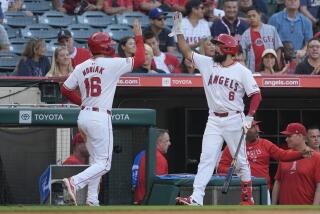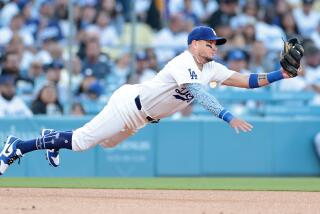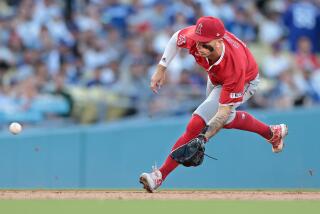Hard Work Is Just All in a Day’s Play for Angels’ McLemore
- Share via
Mark McLemore was walking through the Angel dugout on his way to batting practice two weeks ago when someone asked him what he thought of the prior evening’s Academy Awards show.
“Let’s just say I left after an hour and a half,” he said. “I wanted to see my lady, but she didn’t show, so I left.”
His “lady,” he said, was singer Janet Jackson.
Most of the half dozen writers sitting in the dugout realized McLemore was kidding. (He does like Janet Jackson and he did watch the show on TV for a while, but this was hardly a date. “I wish ,” he says.)
Somebody took him seriously, though, and the story ended up in print. McLemore ended up in a fit of laughter and a journalist ended up with a red face.
It’s not that difficult to see how it happened, when you consider that Mark McLemore’s pregame regimen seldom includes forays into fantasyland. If you can catch the Angel second baseman when he’s not taking extra ground balls or hitting off the tee into a net, he’ll politely but briefly answer your questions with a hint of “there’s work to be done, you know” in his voice.
“We’ve been working out together for four years now and he works as hard as any player I’ve coached,” Angel Manager Cookie Rojas said. “He’s a class kid who’s very dedicated. He hustles all the time.”
McLemore rarely stops moving before a game. If he hasn’t asked Rojas--who has tutored McLemore in the minors, winter leagues, instructional leagues and spring training--to hit him 50 extra ground balls, than he’s working with batting instructor Rick Down.
“I don’t consider it extra work,” McLemore said. “It’s something I’ve always done and no matter how much success I have, I’ll still keep doing it.
“I’ve always taken a lot of ground balls. When I came up (to the big leagues), I saw guys take 5 or 10 and say they were ready. I take 15 or 20 just to get warmed up. People tell me I’ll be tired by September, but it hasn’t happened yet.”
McLemore, who spent five years in the minors waiting for Bobby Grich to retire, got his shot at the second base job last season. He wasn’t tired by September, but he definitely was depressed. The Angels acquired Johnny Ray from Pittsburgh Aug. 29 and McLemore found himself in the minors for a couple of days until the rosters were expanded.
The Angels kept saying that all they wanted from McLemore was a .240 batting average and some great defense. He ended up hitting .236 with 17 errors in 135 games, but his defense ranged from spectacular to embarrassing. He had a tendency to make errors on easy plays.
On the whole, former Manager Gene Mauch thought McLemore’s defense was a little too erratic. He criticized McLemore for having plenty of flair but no consistency and said there were a lot of times last season when he didn’t get errors on balls that should have been caught.
“I was playing every day, but they got another second baseman and then I’m not playing anymore,” McLemore said. “They told me they weren’t happy with the way I was playing.”
McLemore wishes everyone would forget last year. He’s certainly trying, but it hasn’t been easy. He’s quoted in the latest issue of a national sports magazine as saying he might not have gotten off to a good start this year if Mauch were still manager. He says the quote is a total fabrication.
“I never said I might not be playing this well if Gene were still here,” he said. “A lot of people have been trying to get me to say that, but I haven’t. Sure, I’ve said I’m glad Cookie’s here because we go way back. But that doesn’t mean I’m glad Gene retired or feel that I couldn’t have played well under him, too.”
It was Mauch, after all, who decided to move McLemore, 23, into the leadoff spot and transform 10-year second baseman Ray into a left fielder.
Up until a few games ago, the leadoff experiment had been a roaring success. McLemore has been in a mini-slump for a week--coinciding with a bout with the flu that kept him out of the lineup for one day. His batting average has slipped from .320 to .239 in six days.
Still, he has remained an offensive weapon. He has only one hit in his last 21 at-bats, but has scored seven runs in the last eight games. His on-base percentage, one of the most important statistics for a leadoff hitter, is .394. And he is tied for the team lead in runs scored (15) with Devon White, tied with Brian Downing for most walks (12) and leads the club in stolen bases (5).
“I’m more relaxed, more comfortable than I was last year,” McLemore said. “I feel like I can make the plays and hit the ball as hard as anyone. And I love leading off, you feel so involved in the game.
“Last year, I had a terrible year. That’s not the way I can play. I blame it on my mental approach. It wasn’t a bad attitude, I just wasn’t as aggressive and I didn’t have the confidence that I have now.”
Rojas, a former major league second baseman, may or may not be a large factor in that rise in confidence. But he insists that McLemore’s ability would have made him a star someday, with or without his guidance.
“When you have a diamond all you have to do is polish it,” Rojas said. “He can hit from both sides of the plate. He has speed, range, can steal bases and turn the double play. And there’s no doubt in my mind that he’ll hit .280 to .300 consistently. He’ll be the best second baseman in the league one day.
“It’s important that he got off to a good start, it always helps a young player to not have to worry about his hitting, but mainly I think he’s just more comfortable knowing that he’ll be in there every day. That can really mess with a player’s mind, especially a young player’s mind.”
Here’s a scoop. McLemore was in right field during batting practice Saturday and he was playing catch with himself, bouncing a ball off the second-deck facade.
Mark McLemore goofing off?
“I’m still a little weak from the flu,” he said, “so I’m saving my energy for the game.”
McLemore understands priorities. He has his role as a player broken down into seven specific goals:
1. Getting on base.
2. Scoring runs.
3. Taking the extra base.
4. Playing good defense.
5. Hitting well from both sides of the plate.
6. Not striking out.
7. Staying within himself.
He’s doing fine in Nos. 1, 2. He has four doubles, two triples and has been aggressive on the basepaths, so he gets a good mark in No. 3.
His range on defense seems limitless at times, but he’s made three errors, so it’s a question of whether the balls he gets that might get by other second basemen make up for the ones he misplays.
He’s hitting .250 left-handed and .222 right-handed, but those numbers sure looked a lot better a week ago. Still, that’s a mixed review. He has struck out eight times, a few more than he would like. And he’s the only one who can make a judgment on No. 7.
“I’m fairly satisfied with the way I’ve been playing,” he said. “The last few games haven’t been what I’d like and I’m not happy with the errors, but overall things are going well.”
Right now, he’s focused on searching for the kind of offensive groove he enjoyed throughout much of the spring and the first two weeks of the season. It’s not as if he’s going to stop taking those several hundred ground balls a week, he just thinks hitting is the most important facet of the game.
“You’re judged in this game on offensive performance,” he said. “There’s no two ways about it. Anybody who tells you different is lying.”
McLemore went 0 for 4 Sunday against Seattle. He hit the ball hard twice, including a shot to down the left-field line that third baseman Jim Presley managed to stab. The Angels lost, 4-2, and McLemore struck out looking with two runners on to end the seventh inning.
That’s the way it is during slumps. The fact that the Angels have lost six of their last seven doesn’t help, either. So how will McLemore react to the first real pressure of 1988?
“I’m not gonna let these games get me down,” he said. “Maybe going on the road will turn things around for me and the team.”
He sounds upbeat, but Devon White, a close friend, says McLemore has a tendency to get down on himself.
“When Mark’s swinging the bat good, he goes up there with a lot of confidence,” White said, “but when he’s not going so good, we got to stay on him and let him know there’s 162 games.”
More to Read
Go beyond the scoreboard
Get the latest on L.A.'s teams in the daily Sports Report newsletter.
You may occasionally receive promotional content from the Los Angeles Times.






